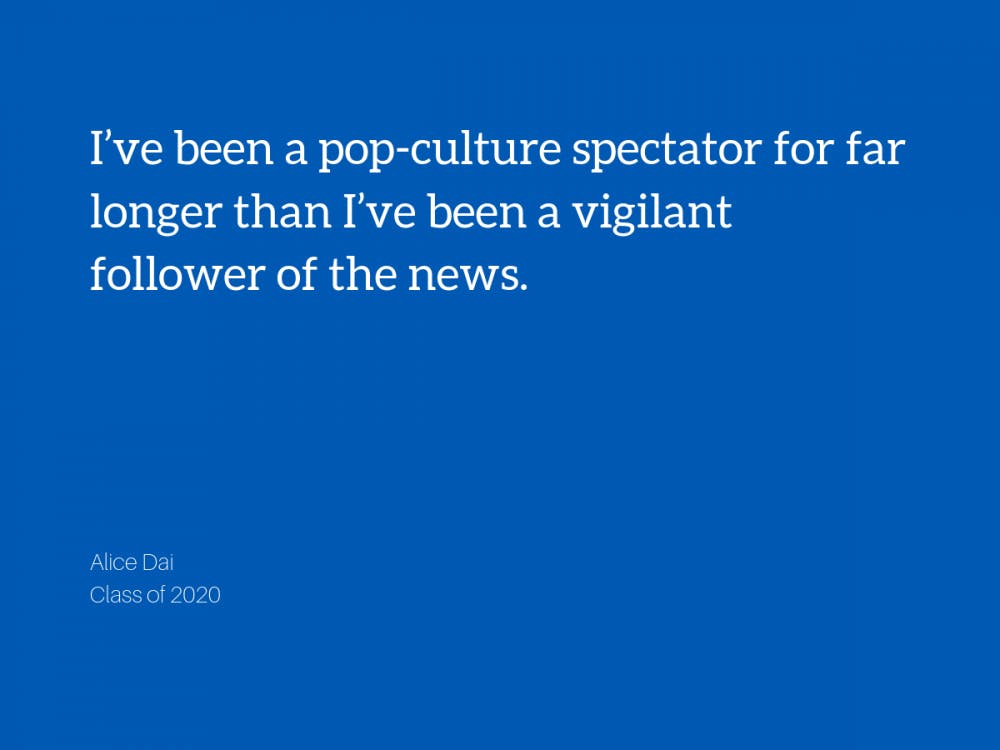I remember New York City being bone-cold the March of my freshman year. I was standing in line for a live taping of “Late Night with Stephen Colbert.” It was Winter Storm Stella that March, and I huddled outside with strangers to keep warm before the show started. A Californian in New York, braving a storm to see Stephen Colbert in the flesh.
To me, Colbert was a celebrity more than anything else. I didn’t know much about his political satire and had never watched a full episode of his show. I remember Colbert’s in-house jazz band (Stay Human, led by Jon Batiste). I remember Colbert sticking his head in a microwave for a bit about missing Obama. Live, I could see all the stage makeup Colbert was wearing. Ah, the energy and dazzle of showbiz.
Last week, I wrote that “Pop culture and politics are incestuously close,” which got me thinking about Stephen Colbert. And late night television. And the role of lighthearted comedy in serious politics, a combination that seems inappropriate but in practice works well; “Late Night with Stephen Colbert” surpassed “The Tonight Show with Jimmy Fallon”—which has been criticized for being too apolitical—and took the top spot among late night programs in the prime 18-49 demographic earlier this year.
I’ve been a pop-culture spectator for far longer than I’ve been a vigilant follower of the news. I don’t remember a time when I wasn’t obsessed with watching. I loved celebrity gossip growing up, and in high school, I went to dances so I could watch other people dance (I know, creepy).
The act of watching might seem passive, but eyeballs glued to a screen can also act like currency. Viewership translates to revenue, and capturing as many eyeballs as possible brings more publicity, more money and, best of all, more votes. There’s a well-worn entertainment industry epithet: All press is good press. The top polling candidates for the democratic nomination have the most followers on Twitter. The last two democratic debates have aired on different network television companies because everyone wants a cut.
Late night programs are perfect comedic fodder for the 18-29 voter demographic who seems committed to a hedonistic entertainment economy. Big words. What I mean is that I and most of my friends have peanut-sized attention spans. If something doesn’t catch our attention, we scroll and move on. Six o’clock news and the daily paper that gets thrown onto the lawn are two things that require a feigned propriety I’d rather trade in for my phone and some good jokes.
Late night shows don’t pretend to be objective or put-together like news journalism. In fact, the most popular late night shows are openly left-leaning and cater to a millenial and Gen-Z demographic that is more Democrat than older generations. The entertainment industry has a reputation for being raunchy, highly-volatile, glamorous, scandalous, drama-prone—all the things that hold my attention. Here, Trump’s fake news tirade against mainstream media loses steam when late night political satire already beats him to the punchline and advertises itself as “fake” news in the form of comedy. But comedy is fraught with truth.
Politics disguised in comedy can trick even the most apolitical into tuning into current events. Studies have shown that political satire on late night television is a gateway for paying more attention to politics. Maybe that’s the way in—late night programming is funny, consistent and convenient after a long day of doing other things. It’s like your mom sneaking cold medication into a bottle of Coke so you can take your meds while also getting a sugar high.
This is all to say: The third democratic debates are airing tomorrow on ABC and Univision from 8 p.m. to 11 p.m. EST. Order takeout. Watch with your friends. Make a night of it, even if it’s just for entertainment. Andrew Yang knows what’s up:
I’m planning on watching the debate in full for the first time. If you need a crash course on how the democratic candidates are polling beforehand, check out Politico's and The New York Times’ election rundowns. After the debate, late night programming will be filled with debate-related jokes. It’ll be another thing to watch. A chance to get in on the joke.
Alice Dai is a Pratt senior. Her column, “cultural q’s,” runs on alternate Wednesdays. Alice and a few other Chronicle Opinion columnists will be live-streaming on the Chronicle’s Facebook page after the debate tomorrow.
Get The Chronicle straight to your inbox
Signup for our weekly newsletter. Cancel at any time.

